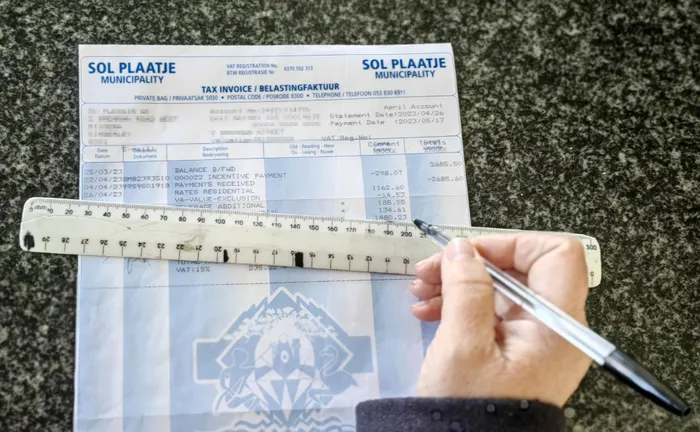Tariff hikes in Kimberley and what the Sol Plaatje Municipality increases mean for households

With municipal tariff hikes taking effect on July 1 and fuel prices rising on July 2, city residents will need to snip, cut, and stretch every rand to make ends meet.
Image: Danie van der Lith / DFA
FROM Tuesday, July 1, residents of Kimberley and surrounding areas served by the Sol Plaatje Municipality will begin to feel the pinch of a series of tariff increases set to stretch already-tight household budgets - especially for the poor and middle class.
The municipality has implemented increases across all major services for the 2025/26 financial year:
- Electricity tariffs (domestic): up by 9.6%
- Water: up by 4.4%
- Sanitation: up by 4.4%
- Refuse removal: up by 4.4%
- Property rates: up by 4.4%
These increases come at a time when residents are already grappling with a rising cost of living and economic pressures that show no sign of easing. For many middle-class families, the increase in electricity prices alone could see their monthly prepaid electricity bill jump by hundreds of rand, especially during the colder winter months when energy usage typically spikes.
Under the new tariff structure, households consuming more than 350 kWh per month, which includes most homes using electric geysers, heaters, or stoves, will now pay R3.99 per unit, up from the previous R3.64. The first 350 kWh will now cost R3.15 per unit. These increases will hit average working-class homes hardest, as their consumption often places them right at the edge of tariff block thresholds.
Water usage has also become more expensive. A family using 20 kilolitres per month, for example, will now pay R35.76 per kilolitre for anything beyond the initial 6 kl, where the base rate is R8.42. Once that usage creeps over 21 kl, the cost per kilolitre rises to R40.25, and even higher for heavier users.
For Poorer Households, The Margins Are Thinner Than Ever
While the municipality’s Indigent Policy offers some relief, including 6 kl of water, 50 kWh of electricity, free sanitation, and once-weekly refuse collection, the reality is that many low-income households fall through the cracks.
The qualifying criteria for indigent support require formal registration, income thresholds, and proof of occupancy. For informal or shared households, or families earning just slightly above the cut-off, there is no financial buffer against these hikes. For those who don’t qualify for relief, the rising tariffs could mean having to choose between buying electricity and buying food.
"Every rand counts now," said local resident Anne du Plessis from Riviera. "We used to get through the month on R1,300 of electricity, but now it’s not even lasting three weeks. And water, well, we think twice before filling the washing machine or watering the garden."
Middle Class Feels the Squeeze
The middle class, long considered the economic backbone of cities like Kimberley, is feeling increasingly pinched. Mortgage payments, school fees, transport, groceries, and now municipal services are collectively pushing many into financial discomfort. With no access to indigent relief, middle-income earners must absorb the full brunt of the increases.
Tariff hikes like these are silent budget killers - it's not just the R100 more here or there; it's cumulative. Over 12 months, it can mean thousands more spent just to keep the lights on and taps running.
More Transparency Needed on Third-Party Vendors
Another area of concern is the role played by third-party electricity vendors, particularly in residential complexes and retirement homes. While the municipal tariffs are fixed, vendors often buy electricity in bulk and resell it at marked-up rates. In many cases, residents may not even realise they’re paying more than official municipal tariffs.
The municipality urges users to verify whether they are purchasing directly or through a complex agreement.
Residents Urged to Use Wisely, Budget Smartly
The municipality has stated that prepaid and postpaid customers will pay the same rate structures and that meter readings, whether estimated or physically taken, will be pro-rated to avoid unfair escalations due to delayed readings. Still, residents are advised to closely monitor usage, avoid unnecessary consumption, and make full use of monthly consumption tracking where available.
The financial year’s tariff hike is valid until June 30, 2026, leaving many households to navigate 12 months of higher costs. As inflation remains high and employment uncertain in many sectors, the impact of these increases is expected to be deeply felt in households across the economic spectrum.
Is Relief Possible?
For now, residents are encouraged to apply for indigent status if eligible and to seek clarity from municipal customer care centres regarding how their bills are calculated.
As winter deepens and electricity demand increases, many in Kimberley will be watching their meters more carefully than ever, hoping that their hard-earned rands can stretch just a little bit further.